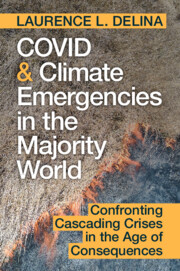 COVID and Climate Emergencies in the Majority World
COVID and Climate Emergencies in the Majority World Book contents
- COVID and Climate Emergencies in the Majority World
- Reviews
- COVID and Climate Emergencies in the Majority World
- Copyright page
- Dedication
- Contents
- Preface
- Acknowledgements
- 1 Portrait of a Grief
- 2 Collapsing Dominoes
- 3 Vulnerabilities Amplified
- 4 Walled World
- 5 Obscene Opulence
- 6 Climate Nationalism
- 7 Toggling the System
- 8 Decluttering Consumption
- 9 Confronting Neo-Liberalism
- 10 Ceasing Arrogance
- 11 Making Amends
- 12 Collective Solidarities
- 13 Decolonising from Within
- 14 Indigenous Epistemology
- 15 Communicating Risks
- 16 The Hubris of Control
- 17 Mobilising the 3.5 Per Cent
- Index
- References
7 - Toggling the System
Published online by Cambridge University Press: 22 June 2023
- COVID and Climate Emergencies in the Majority World
- Reviews
- COVID and Climate Emergencies in the Majority World
- Copyright page
- Dedication
- Contents
- Preface
- Acknowledgements
- 1 Portrait of a Grief
- 2 Collapsing Dominoes
- 3 Vulnerabilities Amplified
- 4 Walled World
- 5 Obscene Opulence
- 6 Climate Nationalism
- 7 Toggling the System
- 8 Decluttering Consumption
- 9 Confronting Neo-Liberalism
- 10 Ceasing Arrogance
- 11 Making Amends
- 12 Collective Solidarities
- 13 Decolonising from Within
- 14 Indigenous Epistemology
- 15 Communicating Risks
- 16 The Hubris of Control
- 17 Mobilising the 3.5 Per Cent
- Index
- References
Summary
To tilt the scales in favour of a faster energy transition, significant efforts to decarbonise the economy are required. This means flipping the political and economic systems that are failing to deliver deep decarbonisation and replacing them with ones built on compassion and justice. Through a cascade of regime transitions in the energy sector, mass mobilisation, and support politics, these reforms are achievable.
Keywords
- Type
- Chapter
- Information
- COVID and Climate Emergencies in the Majority WorldConfronting Cascading Crises in the Age of Consequences, pp. 62 - 72Publisher: Cambridge University PressPrint publication year: 2023
